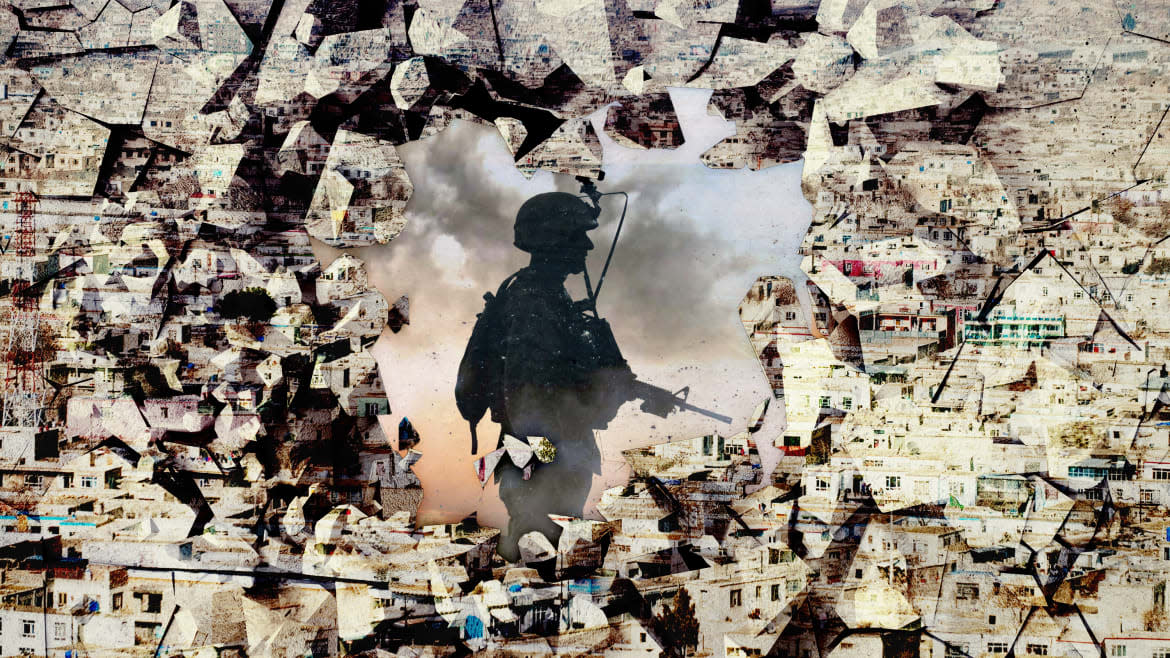The Afghanistan Debacle Summed Up: We Suck at Nation Building

Back in 2005, I found myself interviewing a retired Marine general about his experiences on Iwo Jima and in Vietnam for a book I was writing on the history of the Marine Corps. Before putting on the tape, Major General Fred Haynes, a tall, courtly Texan in his mid-eighties, sighed, and said, “James, I hate to say it, but we are never going to win this thing in Afghanistan. Thirty-seven years in the Marine Corps taught me a few things about the United States. We are very good at blowing things up and inflicting maximum punishment on our adversaries, but we ought to get the hell out of the nation-building business because we don’t know what we are doing.”
Haynes was hardly the only retired military officer to hold this opinion back then. Even more than during Vietnam, there was a widespread sense among military professionals, as well as among foreign policy experts and journalists, that things were not going at all well in Afghanistan, despite the steady and unceasing flow of “progress” reports from the Bush administration and senior field commanders.
Year after year, the fighting dragged on with little perceptible change. The Bush team turned their strategic attention to Iraq not very long after the stunning success of the Special Forces and CIA-led campaign to oust the Taliban from power in December 2001. While soldiers and Marines served multiple tours fighting and dying in obscure Afghan valleys, on steep and unforgiving mountain slopes, and in urban mazes, the American people, in whose name the military fought, went to the mall.
Since the astonishingly rapid collapse of the American-supported regime in Kabul before the Taliban last August, Americans have done their best, it seems, to forget about their most recently lost war, though the anniversary prompted several important reflections and reassessments by participants.
The most striking of these contributions, for my money, comes from a highly decorated Special Forces Marine who went on to serve in Afghanistan as a CIA paramilitary officer. Elliot Ackerman’s The Fifth Act: America’s End in Afghanistan is a short but gut-wrenching memoir, with three intertwined narrative strands. The primary one is a disturbing and dramatic account of Ackerman’s frantic efforts over the course of a couple of weeks to arrange for the evacuation of several hundred Afghans from Kabul Airport as the Taliban are closing in. The author was one of the leading players in a joint effort by a host of veterans and government officials around the world to secure the Afghans’ freedom. Ackerman carries out his duties, remarkably, while on a long-planned family vacation in Italy with his wife and three young children. That’s strand No. 2. The third narrative consists of well-rendered accounts of key incidents/adventures from his multiple combat tours in the War on Terror.
What Did Our Generation Learn in Iraq and Afghanistan?
If you want to know how a Special Operations team works in the field, you’ve come to the right place. Ackerman conveys the burdens and challenges and the emotional rollercoaster ride of elite small-unit command as well as any of the earlier War on Terror-veteran authors I have read, and I have read quite a few. As the narrative shuttles back and forth between Ackerman’s combat experiences, his family vacation, and the decidedly touch-and-go effort via cellphone and a bewildering variety of online apps to get the Afghans inside the airport perimeter, the reader comes to experience the grinding regret and guilt, as well as a torrent of other emotions, that grip the men and women who fought in this war, both Afghan and American, as the end of the 20-year conflict approaches.
The stories of the rescue efforts are often gripping and harrowing. Thanks to the sheer resourcefulness and resolve of Ackerman and scores of other people in his network, most of the Afghans ultimately reach their objective. Among those contacts are a former chairman of the Joint Chiefs of Staff, Admiral Mike Mullen, and a former CENTCOM commander, General John Allen, U.S Marines. As luck would have it, the unit in charge of security at the airport is, in Marine parlance, 1-8, the First Battalion of the 8th Marines, the unit in which Ackerman fought as a platoon commander in the Battle of Fallujah in 2004. On top of that, Ackerman knows that unit’s current commander personally. As you can imagine, this helps grease the skids considerably.
One senses throughout the book a palpable sense of bitterness and frustration, even anger, that so many Afghans have been left behind to suffer a bleak fate. Again and again, Ackerman returns to one theme: lack of commitment on the part of the U.S. government and the American people, and how this lack facilitated the loss of faith and confidence in the government of Afghanistan in the eyes of its own people. He sees signs of American tentativeness and wishful thinking everywhere, but particularly, it seems, in the lack of permanent American bases and structures: “The ultimate tragedy that unfolds in Afghanistan is the accumulation of hundreds of bad decisions,” he writes. “However, the one I can’t seem to get out of my head is that we built in plywood.”

The volume also includes a fair amount of Ackerman’s own commentary/analysis on the key political and military decisions of the Bush, Obama, and Biden administrations. His points are intelligently argued and gracefully expressed—Ackerman is a very fluid and expressive writer—but at times I felt these passages would be more at home in a longish opinion essay or think piece than in a memoir, for somehow, they diminish the powerful punch of the very human stories he tells so well.
Ackerman left the Marines as a captain. His was a small-unit, up-close and personal war. An American warrior named David Petraeus had a major impact on the course of the war, both directly as one of the 15 commanding generals in the campaign, and also as the chief architect of the counterinsurgency strategy that failed so miserably in Afghanistan.
Petraeus has also weighed in with his thoughts about how the war looks a year after the fall. His essay in The Atlantic, “Afghanistan Did Not Have to Turn Out This Way,” is rather disappointing. If there was some new personal insight or revelation about the war itself, or what we can take away from the tragedy, I couldn’t find it. The tone of the piece is detached and clinical, almost as if Petraeus himself wasn’t a key player in the events, but an outside observer.
HBO’s ‘Escape From Kabul’ Goes Inside the Afghanistan Evacuation From Hell
The “foundational mistake” was “lack of commitment,” writes the general, echoing the words of Captain Ackerman and many other veterans. By 2010, when he was in charge in Afghanistan, “we had established the right big ideas and overarching strategy,” but just a year later, Barack Obama pulled the plug on the project by releasing the details of a premature drawdown of American forces. While claiming that the Obama decision pretty much doomed the effort, Petraeus goes on to provide a laundry list of other familiar mistakes. Invading Iraq had a devastating effect on the American effort in Afghanistan, stripping the theater of scarce intelligence assets and leading to serious strategic neglect in Washington. By the time we conducted the surge in Afghanistan in 2010, “we had missed the opportunity to take advantage of a protracted period with little violence” to build a stronger Afghan government and security forces.
Had we avoided such mistakes, Petraeus argues unconvincingly, we might have been able to stabilize the Kabul government and hold off the Taliban advance indefinitely.
Of course, how one feels about Joe Biden’s decision to withdraw all U.S forces from Afghanistan, and about the frantic last act of pulling out of Kabul in August 2021, hinges on one’s view of the viability of the war itself. Certainly, one can empathize with the views of Ackerman and so many of his contemporaries that it was morally wrong to give up and leave. It was morally wrong.
Sadly, strategic decisions such as pulling out of lost wars cannot be made on a strictly moral basis. By the time Biden reached the presidency, the strategic logic for staying put in Afghanistan had evaporated. Biden had the courage to recognize this reality, and to act on it. The rise of China and Russia as rivals and possible adversaries, and the decline of America’s conventional deterrence against China, made it necessary to detach from Afghanistan, and indeed, from the Middle East proper. Realpolitik demanded that such a decision be made. And so it was.
Frankly, I found it surprising that neither Ackerman nor Petraeus broached what I will call the mother of all mistakes in Afghanistan: George W. Bush’s decision to wage a nation-building campaign in a country whose history and politics neither he nor his advisers understood. It was a decision born of a lethal amalgam of hubris and ignorance. Afghanistan has not been called the “Graveyard of Empires” for nothing. A British soldier with a flair for the English language named Winston Churchill noted back in 1897 that much of Afghanistan “was in a continual state of feud and strife prevails through the land… Every man’s hand is against the other, and all are against the stranger.”
An uneasy peace blankets the hard, mountainous land and river valleys of Afghanistan today, but there is already much talk about a resistance movement to the Taliban. Life may be back to business as usual any day.
Get the Daily Beast's biggest scoops and scandals delivered right to your inbox. Sign up now.
Stay informed and gain unlimited access to the Daily Beast's unmatched reporting. Subscribe now.

